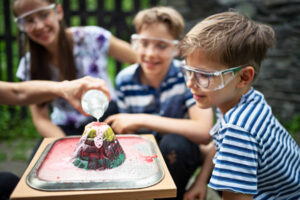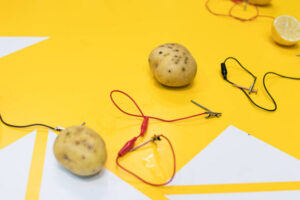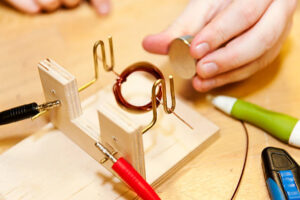Science is all about curiosity, exploration, and discovery. It’s a subject that fuels our understanding of the world around us and opens up doors to countless possibilities. Engaging in science projects not only enhances students’ knowledge but also fosters critical thinking, problem-solving skills, and a passion for learning. Whether you’re a parent looking for fun activities to do with your child or a student seeking an exciting project for a science fair, here are 15 of the best science projects for students.
Science projects for students are a perfect blend of education and entertainment, offering a hands-on approach to understanding complex scientific concepts. Whether you’re a parent looking for engaging activities or a student preparing for a science fair, here are 15 science projects that promise both learning and fun.
-
Volcano Eruption
 (Photo from iStock)
(Photo from iStock)
Creating a volcanic eruption model is a classic and visually captivating project. It helps students understand the basics of chemical reactions. You’ll need baking soda, vinegar, and a small model volcano made of clay or papier-mâché. Add the baking soda to the volcano, then pour in vinegar to simulate an eruption.
-
Solar System Model
Build a scale model of the solar system to comprehend the relative sizes and distances of planets. You can use various materials like Styrofoam balls, paint, and a wooden dowel. Research each planet’s characteristics and arrange them according to their distance from the Sun.
-
Homemade Slime
Slime-making experiments are both fun and educational. Create a non-Newtonian fluid by mixing white school glue, water, borax, and food coloring. Discuss the science behind polymers and how they interact with the ingredients.
-
Growing Crystals
Growing crystals is a fascinating way to learn about chemistry and mineral formation. Common household items like sugar, salt, or alum can be used to grow crystals. Students can experiment with different solutions and conditions to optimize crystal growth.
-
Potato Battery
 (Photo from iStock)
(Photo from iStock)
Demonstrate the basic principles of electricity generation using a potato battery. Insert two different metal electrodes into a potato and connect a small LED or clock. This project helps students understand the concept of chemical energy conversion into electrical energy.
-
Water Filtration System
Develop a DIY water filtration system to understand the importance of clean water. You’ll need materials like sand, gravel, charcoal, and containers. Show how these components can effectively filter impurities from dirty water.
-
Paper Airplane Aerodynamics
Explore the science of aerodynamics by designing and testing paper airplanes. Students can modify their planes to improve stability, distance, and accuracy. This project is an excellent introduction to the principles of physics and engineering.
-
Electromagnetic Train
Construct a simple electromagnetic train using a battery, a coil of wire, and a magnetic object. When the circuit is closed, the electromagnetic field propels the train forward. It’s a great way to learn about electromagnetism and its applications.
-
Egg Drop Experiment
 (Photo from iStock)
(Photo from iStock)
The egg drop experiment challenges students to design a contraption that protects a raw egg from breaking when dropped from various heights. This project teaches about the principles of physics, engineering, and impact forces.
-
Dissolving Candy
Explore the concept of solubility by dissolving different types of candy in water. This project allows students to observe and record how different candies dissolve at various rates, teaching them about the science of solutions.
-
Static Electricity
Investigate static electricity by creating a simple static electricity generator. You’ll need a plastic comb, a piece of fabric, and some small pieces of paper. Rub the comb against the fabric to generate static electricity and observe its effects on the paper pieces.
-
pH Experiments with Cabbage Juice
Use cabbage juice as a natural pH indicator to test the acidity or alkalinity of common household substances. This project offers hands-on experience with acids and bases and can be a great introduction to chemistry.
-
Magnet Experiments
 (Photo from iStock)
(Photo from iStock)
Explore the properties of magnets and magnetic fields through various experiments. Test different materials to see if they are attracted to magnets, make a compass, or build a simple electromagnetic crane to pick up small objects.
-
Sound Vibrations
Discover the science behind sound by building musical instruments. Create a simple drum, a xylophone, or even a kazoo to explore how vibrations create different sounds. This project introduces students to the physics of sound waves.
-
Density Tower
Construct a density tower with layers of liquids like oil, water, and syrup. This project showcases the concept of density and the principle that objects of higher density sink in substances of lower density. It’s a visually striking way to teach this fundamental scientific concept.
Conclusion
Engaging in science projects is a fantastic way for students to explore the wonders of the natural world and develop critical thinking skills. These 15 science projects cover a broad range of scientific principles, from chemistry to physics, and are suitable for students of various ages and skill levels. Whether you’re a teacher, a parent, or a student looking for an exciting project, these ideas can inspire a lifelong love of science and learning. So, roll up your sleeves, gather your materials, and start exploring the fascinating world of science through these engaging projects.
These 15 projects are not only informative but also incredibly entertaining. They foster a love for science while encouraging students to explore the intriguing world of scientific phenomena. So, gather your materials, let your curiosity run wild, and embark on a journey of discovery through these delightful science projects.
In conclusion, science kits are invaluable tools that foster a love for learning and exploration in the field of science. These kits provide students with a hands-on, immersive experience that goes beyond textbooks and traditional classroom teaching. They inspire curiosity, critical thinking, and problem-solving skills, making science not only understandable but also enjoyable.
By offering a wide range of experiments and activities, science kits cater to different ages and skill levels, making science accessible to all. They instill a sense of wonder and discovery that can lead to a lifelong passion for scientific inquiry. Additionally, science kits are a fantastic resource for parents and teachers, simplifying the process of teaching complex concepts in a fun and engaging way. Overall, science kits play a pivotal role in nurturing the next generation of scientists and innovators, making the world of science more accessible and exciting for everyone.
Reference:
Byjus
Your little friend needs a toy, confused between what to choose?, what are you waiting for click on the link below:
How to choose right dog toy on your own




